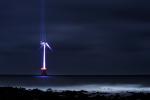- Dispatch 4 from the 7th Jeju Forum for Peace and Prosperity, May 31-June 2
article_right_top
The purpose of this World Leaders’ Session on June 1 was to discuss some of the more pressing issues affecting Asia, and how Asia is affecting the world. Topics discussed included the friction between the US and China, green growth, and nuclear power. The format of this was interview-based, as moderator Park asked presenters Keating and Han questions.
As with the Opening Ceremony, former Prime Minister of Thailand Abhisit Vejjajiva was scheduled to speak but was absent. Also, the discussion was cut short due to its late start at 11:50 a.m. instead of at 11:30 a.m.
The first question posed by the moderator to Keating dealt with the current, complicated relationship between the US and China, with the former attempting to “re-engage” with Asia, and the latter attempting to strengthen its economic and political position.
“The United States and China have a choice to make about the kind of relationship they wish to have,” Keating said. “And that choice will determine the strategic shape of the Asia Pacific [region] and the kind of lives the rest of us live.”
China, he said, is a country regaining power. It has been 200 years since it was in a position of “preeminence in Asia” and other countries need to view it with “legitimacy” and not view its economic and political rise negatively. If the rest of the world can do this then a positive “framework” that includes the major world powers can be created.
“What we need is a cooperative structure in Asia, one that China can emerge in but not dominate,” he said, for the US has an important role in creating a balance among all countries.
Han had a similar position concerning the role of free trade agreements and other forms of multinational collaboration, saying that the “only way towards peace and prosperity in the region is through integration — economic as well eventually political.”
In 40 years time, Han sees a single Asia joined through these agreements which also open the region up to the world.
One of his concerns, as he currently serves as the Chair of the Board of Directors for the Green Growth Institute in Seoul, has to do with green growth.
Until 2008, he said, South Korea was very slow to adopt green growth policies, but since Lee Myung Bak became president the country has more actively pursued this avenue for economic purposes.
“In Asia the demand for energy will increase by three times by 2050,” he said, adding the currently Asia accounts for more than 40 percent of global emissions. With the increase in the demand for power, emissions will increase, something he stressed must change.
Han’s Green Growth Institute will soon become an international organization, suggesting that South Korea is ahead of the curve in sustainable development in the region, “but we can’t do it alone.”
The goal is to share their best practices with developing countries so as to grow economically, as well as environmentally sustainably.
Keating agreed that the environment has suffered at the growth of Asia’s expense.
“It is true for these sort of levels of economic growth we’re seeing in North Asia and other parts of the world that the environment can’t take the punishment,” he said.
If the correct policies are passed, he continued, then these countries will not only see their GDP increase, it will be a more “desirable” GDP.
Park then turned the conversation to a more controversial aspect of green growth — the use of nuclear energy. In the wake of the Fukushima nuclear disaster Park said that Germany will not build any more power plants and Japan has, at least temporarily, stopped producing power with theirs.
“It is true that Australia has a substantial part of the world’s identified uranium supply and we’ve been selling into that market for some time,” said Keating. “The prospects of the uranium market are much less good than before Fukushima.”
Keating said that for an island nation, a nuclear disaster affecting Tokyo would have a dramatic economic impact and from a public safety point of view “there’s probably wisdom in the Japanese decision to either close down or hose out the Japanese industry.”
Like Three Mile Island for America and Chernobyl in Russia, “Fukushima was a big turning point,” he said.
For Han it is not nuclear power that is the issue, it is the safety mechanisms and that smaller nuclear power plants can be “greatly safeguarded.” He readily admitted, though, to not being a nuclear scientist. “So maybe the future trend would be to offer smaller and medium sized reactors,” he said, adding that shale gas could be a possibility.
Han sees the future need for energy as an important issue, and necessary for Asia to continue growing.
“If the safety can be guaranteed nuclear is a really good source of energy. But the problem is how to guarantee the safety? This is a problem scientists have to solve,” said Han.
|
The Jeju Weekly editor@jejuweekly.com
<저작권자 © 제주위클리 무단전재 및 재배포금지>






